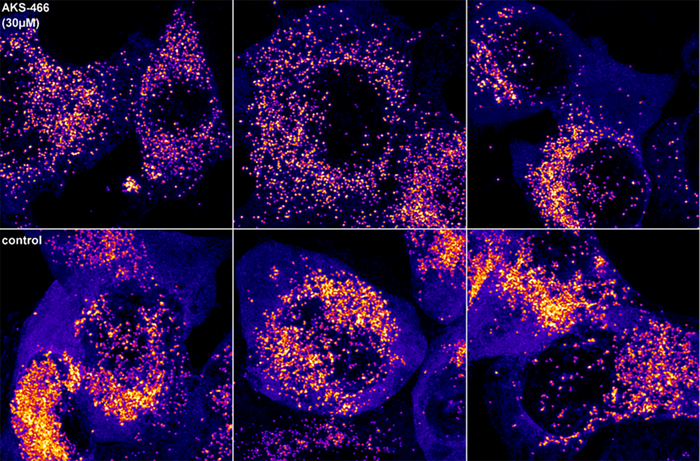Fluoxetine, a common antidepressant, inhibits the SARS-CoV-2 coronavirus in cell cultures and in preparations from human lung tissue. This was demonstrated by researchers at Julius-Maximilians-Universität (JMU) Würzburg in the summer of 2020. However, the mechanism of this inhibition was utterly unclear, so the teams continued their research.

Credit: Jan Schlegel / University of Wuerzburg
Fluoxetine, a common antidepressant, inhibits the SARS-CoV-2 coronavirus in cell cultures and in preparations from human lung tissue. This was demonstrated by researchers at Julius-Maximilians-Universität (JMU) Würzburg in the summer of 2020. However, the mechanism of this inhibition was utterly unclear, so the teams continued their research.
To this end, they developed the molecule AKS466, which is very similar to fluoxetine and also suppresses coronavirus. After extensive comparative studies published in the scientific journal Cells, it is now clear how the antidepressant inhibits the replication of the coronaviruses.
Excess of ceramides inhibits the SARS-CoV-2
Fluoxetine, as well as AKS466, trap the viruses in the lysosomes of the cell. Put simply; these are small vesicles in which digestive processes take place. In the lysosomes, both active substances also suppress the activity of an enzyme group, the acid ceramidases. This increases the concentration of ceramides, a group of the body’s lipids. The excess of ceramides is ultimately responsible for preventing the SARS-CoV-2 coronavirus from reproducing.
“The enzyme ceramidase is a new, completely unexpected target structure for antiviral therapy,” says Professor Jochen Bodem from the JMU Institute of Virology and Immunobiology. His group collaborated on this project with the teams of JMU professors Jürgen Seibel (Organic Chemistry) and Markus Sauer (Biotechnology and Biophysics) intensively. The work was funded by the pharmaceutical company Novartis and the Free State of Bavaria.
Consequences for therapy research
The new findings are significant for the fight against SARS-CoV-2.
On the one hand, ceramides could be directly suitable as active agents against the virus.
On the other hand, the fluoxetine-like molecule AKS466 might be superior to the original. This is because fluoxetine inhibits the enzyme group of acid sphingomyelinases, leading to side effects when used. AKS466 does not inhibit these enzymes – it should have fewer adverse side effects.
Thus, the Würzburg researchers are showing two new ways that could lead to an improved therapy of SARS-CoV-2 infections. Next, they would like to clarify the question of how the two active substances manage to trap coronaviruses in the lysosomes.
Journal
Cells
DOI
10.3390/cells11162532
Method of Research
Experimental study
Subject of Research
Cells
Article Title
The Acid Ceramidase Is a SARS-CoV-2 Host Factor
Article Publication Date
15-Aug-2022




